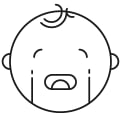Learning About Bottle-Feeding: Tips for Common Problems
Bottle-feeding is a skill that gets better with practice. But it's common to have problems. These may include your baby refusing the bottle, crying or fussing, and spitting up a lot during feeding. Be patient with yourself and your baby. With time, you'll learn what works best for both of you.
Tips for managing common bottle-feeding problems
Before you feed your baby, make sure that all the bottle parts are washed and ready to use. If you are using formula, use infant formula approved for sale in Canada by Health Canada.
When you feed your baby from a bottle:
- Hold your baby in your arms in an almost upright position and let them seek the nipple.
- When they’re ready, put the nipple deep enough into their mouth until they have a wide latch. They should not gag.
- Always hold your baby until they’re finished their feed. Don’t leave them alone with a bottle in their mouth as they might choke.
- Choose a low flow nipple with a single hole. Tip the bottle so the liquid just fills the nipple.
- Follow your baby's feeding cues for hunger and fullness.
- Learn more about feeding your baby from a bottle at Healthy Parents, Healthy Children.

Bottle refusal
- Gently rub the bottle nipple on your baby's cheek. This encourages them to open their mouth.
- If your baby stops eating and turns away, they may be full.

Crying or fussing
- Feed your baby before they get too hungry and cry.
- Look for signs that your baby may be hungry. For example, they may pucker or smack their lips.
- Calm them down by gently rocking them or walking while feeding them. Play soothing sounds.

Spitting up a lot
- The breast milk or infant formula may be coming out of the bottle too fast. Try using a slow flow or different size bottle nipple.
- Change your baby's position.
- Burp your baby during and after feeding.
- Your baby may have a food sensitivity if this happens every time they eat. Talk to your doctor about trying a different formula.
- Call Health Link at 811 or your healthcare provider if you notice your baby:
- Has any signs of choking, coughing, or sputtering while feeding.
- Is not feeding well.
- Is vomiting, showing signs of dehydration, or has any signs that concern you.

Tooth problems
- Don't give bottles to your baby in the crib. And don't prop their bottle to feed them.
- Don't put juice in the bottle.
- After 6 months of age, teach your baby to use a sippy cup.
- Ask your doctor or dentist about how to care for your baby's gums and teeth.
When should you call for help?
Watch closely for changes in your child's health, and be sure to contact your doctor, public health nurse, or Health Link at 811 if:
Where can you learn more?
Go to https://www.healthwise.net/patientEd
Enter G598 in the search box to learn more about "Learning About Bottle-Feeding: Tips for Common Problems".
Adaptation Date: 07/11/2024
Adapted By: Alberta Health Services
Adaptation Reviewed By: Alberta Health Services
